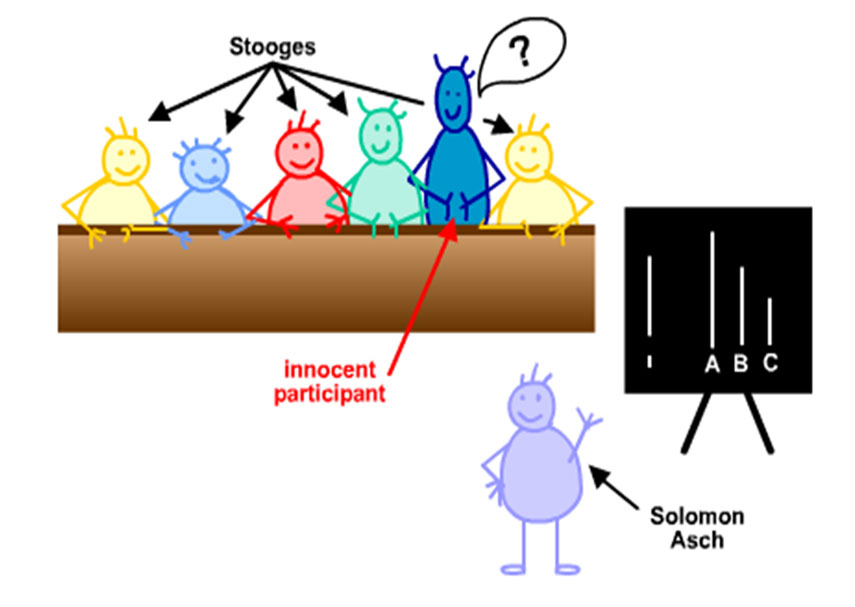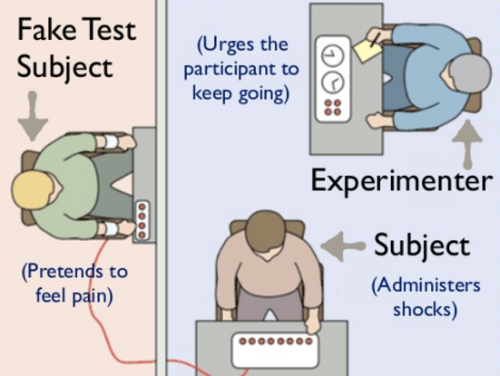Peer Pressure


In 1978, a cult known as the People’s Temple, led by Jim Jones resulted in the creation of Jonestown in Guyana, South America. This movement was started because people with no direction in their lives were convinced that society was falling apart and their new leader Jim Jones was creating a better life for them. Regrettably, it resulted in the mass suicide of 909 people by cyanide poisoning and the murder suicide of many more. It was the biggest killer of Americans due to a deliberate act until the 9/11 terrorist attacks.
Move forward 40 years and this peer pressure still exists in a mutated form. On the radical end of the continuum, people are still murdering on behalf of approval off their peer group, while teenagers take that one drug they don’t want to, which puts their life at risk. People still have a fundamental need or desire to be a part of our group, and this results in peer pressure. It is something we are all subject to due to the social psychology of human nature. However, some are more susceptible than others and the only way you can fight the beast is if you are educated about it. This post aims to highlight important findings in social psychology research that can help you and your child benefit from peer pressure.

In 1951, psychology researcher Soloman Asch ran an experiment to test peer pressure. In the experiment, different groups of 6 people were asked to pick which of three lines was longest. It was very clear that one line (A) was longer than the others. However, Asch had purposefully chosen 5 of the 6 participants to be decoys in the research. The decoys all picked B and as a result, the one actual participant also picked A (even though he or she knew it was wrong). This showed the power of peer pressure. But why is it so powerful?
The authoritarian parenting style is very popular. The ‘I’m right and you’re wrong’ approach. You have to do what I say because I’m the parent and if you don’t, you’ll be punished. Of course, we have come a long way in the 21st century by banning corporal punishment, but psychological punishment still exists. If you want to learn more about how to communicate more successfully with children, revert back to our transactional analysis blog post. But now, I am going to highlight why the authoritarian parenting style is detrimental and why it could have influenced you. The biggest danger to authoritarian parenting is that it suppresses children’s abilities to think for themselves. And children are naturally curious. They want to explore their environments before they can speak and when they learn to talk, they are proven to ask ‘why’ 5 million times (based on personal experience and not actual science). Authoritarian parenting promotes an environment where certain things are just the way they are. We can’t change them and they have always been like that. Of course, this might be effective in ensuring that your child does what you say, because you really think you know best, but the problem is that the child will always be submissive. When the parent is not there, the child will need guidance from someone else. In some cases, this is fine. For example, following the lead of the teacher. But in other cases, it can be risky. For example, being submissive to the stranger they just met, or the boy in the class who has started taking drugs.
Teach kids how to think and they’ll think for themselves.
Terry Kaufman, Institute of Mathematics and Computer Science (IMACS)
And on top of Jonestown, we’ve seen some of the worst atrocities as a result of this. Look at Nazi Germany. How could so many people turn a blind eye to the horrors of the holocaust? The simple answer is fear, but you need a group of people to take the wrong turn to instil that fear. The foundation of this group of people were those who were easily influenced. They were the ones who were persuaded that Nazi Germany was the way forward because they were incapable of thinking for themselves. These were the ones who wanted to be accepted because they had no control over the world. In 1963, Yale psychologist Stanley Milgram aimed to explain why Nazi Germany happened by testing levels of obedience. In the experiment, researchers wore white coats and asked participants (referred to as teachers) to quiz question other participants (referred to as learners) in another room and if they got it incorrect, they would give them a shock. For every next question they got wrong, the power of the shock would increase (30 switches with voltage from 15 volts (slight shock) to 450 volts (severe dangerous shock)). Of course, the participants in the other room were actors and they were not hooked up to anything but they still responded in anguish when they were given the shocks, even to the extent that they stopped replying on some of the higher shocks, indicating that they would have died. When the real participants hesitated, they were prodded by the researchers in white coats to continue. Participants did comply and the results were shocking (excuse the pun). Two thirds of the participants continued to the highest voltage and all participants went up to 300 volts, despite the screams, begging and lack of response. The study showed that ordinary people would follow an authoritarian figure, even to the degree of killing another human being. Scary stuff.

So how do we reverse this? Well we educate children in an alternative form, and this is where science becomes important. Science teaches children about the scientific method, which involves 7 steps to ensuring that something in the world is the way it is because it has been proven to be true. An essential step is critical thinking, which is the importance of skepticism, not taking everything at face value and making judgements based on an analysis of facts. While this may ruin many films (in reality, Simba would have ate all of his animal counterparts based on scientific research done on lions), it teaches children that ‘it’s just the way it is’ is not a valid answer. If children can think critically about a situation, they will be less inclined to be subject to peer pressure.

So how do we reverse this? Well we educate children in an alternative form, and this is where science becomes important. Science teaches children about the scientific method, which involves 7 steps to ensuring that something in the world is the way it is because it has been proven to be true. An essential step is critical thinking, which is the importance of skepticism, not taking everything at face value and making judgements based on an analysis of facts. While this may ruin many films (in reality, Simba would have ate all of his animal counterparts based on scientific research done on lions), it teaches children that ‘it’s just the way it is’ is not a valid answer. If children can think critically about a situation, they will be less inclined to be subject to peer pressure.
Appreciate when your child asks why and actually follow up and find out why something is the way it is. It also opens up your mind to learn more and not take things for granted. If one learns what peer pressure is, the scientific method and most importantly, how to think from a young age, they won’t be led astray. A child who can think for themselves can make better decisions. So teach your child or yourself how to think. Learn from history!
Yours Sincerely,
The Motus Movement.